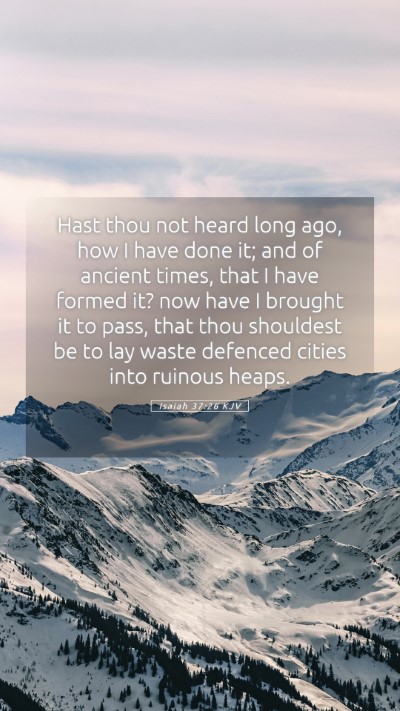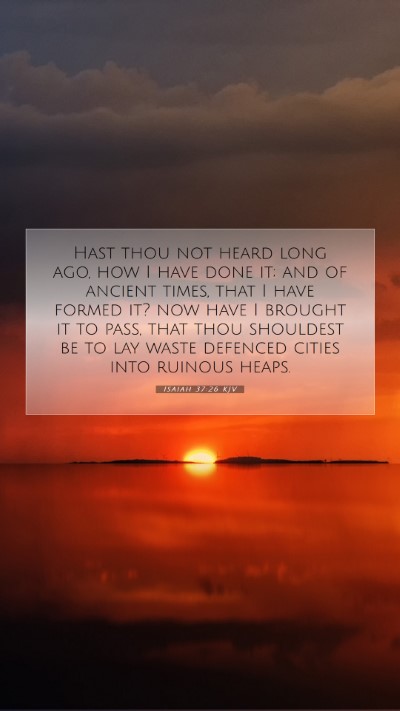Understanding Isaiah 37:26
Isaiah 37:26 states:
"Hast thou not heard long ago, how I have done it; and of ancient times, that I have formed it? now have I brought it to pass, that thou shouldest be to lay waste fenced cities into ruinous heaps."
This verse is a powerful declaration of God's sovereignty over historical events and His ability to orchestrate the outcomes for His purposes. Let's explore its meaning through insights from public domain commentaries by Matthew Henry, Albert Barnes, and Adam Clarke.
Verse Meaning and Interpretations
The verse highlights several key themes:
- God's Eternal Sovereignty: The phrase "Hast thou not heard long ago" indicates that God's actions are not new; they have been foreseen and planned from the beginning of time. It emphasizes that God's decrees were established long before the current events unfolded.
- Fulfillment of Prophecy: God asserts that He has formed the events, bringing them to fruition according to His divine will. This reflects the fulfillment of His promises and prophecies found throughout Scripture.
- Human Authority and Its Limits: The verse serves as a reminder of the frailty of human power in contrast to God's strength. While nations may rise or fall, it is ultimately God who governs the course of history.
- The Purpose Behind Destruction: The mention of laying waste to "fenced cities into ruinous heaps" illustrates God's judgment upon nations that oppose Him. It conveys the idea that God's actions serve both a redemptive purpose for His people and a corrective judgment against sin.
Insights from Commentaries
Matthew Henry's Commentary
Henry emphasizes God's providential control over nations and history. He asserts that God's foreknowledge and foretelling of events demonstrate His sovereignty. Henry points out that the destruction referred to in the verse serves to remind Israel of God's might over their enemies and His ongoing covenantal faithfulness.
Albert Barnes' Notes
Barnes interprets the verse as God reminding His people of His actions in history. He suggests that God's ability to bring about destruction reflects His power not only in preservation but also in judgment. Barnes also draws a connection between this and the historical context of Assyria's rise, noting that God allowed such nations to play a role in His redemptive plan.
Adam Clarke's Commentary
Clarke delves into the historical and contextual implications of Isaiah's prophecy. He mentions that the referenced "fenced cities" denote fortified areas that should not have been easily overtaken. His analysis affirms that God's power is indispensable and that even the most secure places are under His authority.
Application of Isaiah 37:26
This verse encourages believers to recognize God's overarching authority, providing comfort in turbulent times. The reminder that God is in control assures us that He governs the outcome of world events, inspiring faith and trust in His plan.
Cross References
- Isaiah 10:5-6 - Illustrates the Assyrian's role as an instrument of judgment.
- Isaiah 14:24-27 - God’s plans against nations reflect His sovereign will.
- Jeremiah 18:7-10 - Emphasizes God's capacity to shape nations according to His purposes.
- Psalms 2:4-6 - God’s sovereignty mocked by rulers showcases His ultimate authority.
Conclusion
The verse Isaiah 37:26 encapsulates a profound truth concerning God's sovereignty over the affairs of men, reinforcing the believer’s faith in God’s omniscience and omnipotence. As we engage in Bible study insights and delve into Bible interpretations, let this passage serve as a foundation for understanding God’s providential care and justice.
By studying such passages, individuals seeking bible verse explanations will cultivate a deeper understanding of Scripture, enriching their spiritual lives and empowering them to respond to God's guidance in their day-to-day experiences.


